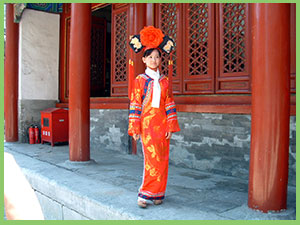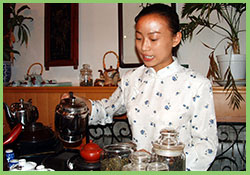As all people known, China has very rich of its culture for many thousands years. We've mentioned some of the important culture and known to the world in below.
Wushu (also known as Kungfu),
Fengshui, Taiji, Qigong,
Chinese architecture, traditional Chinese medicine, traditional Chinese massage, the lunar calendar and the Chinese zodiac are all parts of Chinese legacies.
Kungfu
Kungfu is often mistaken by the uninitiated to be simply a physical activity. However, it is far more than just a healthful exercise. Kung meaning discipline and Fu meaning person refers to a disciplined person. Shaolin Kungfu, which is one of the most famous forms of kungfu, originated in the Shaolin Temple on Mount Songshan at Dengfeng in Henan Province.
Feng

Feng means wind and breath and shui means water and blood. So fengshui means water is the blood and breath of the earth. According to fengshui, any process that is generative or productive produces good fortune. Destructive processes, naturally, produce bad luck. For example, a person born under the element of metal should not live in a house facing south, because south belongs to the element of fire, and fire melts metal in the destructive order of the elements. A good direction for this person's house to face would be southwest, because southwest belongs to the element earth which harbors ores, and thus produces metal.
Traditional Chinese medicine (TCM)
It is a medical system that has been used for thousands of years to prevent, diagnose, and treat disease. It includes knowledge gathered over the centuries about herbs, nutrition, meditation, restorative physical exercise, massage, and acupuncture. In recent years, TCM has become popular in western countries.
Qigong
Qigong, which means breathing exercise, is another form of Chinese folk sport. Like martial arts, it has a long history and is widely popular. It is believed that Qigong was known 4,000 to 5,000 years ago. Bronze objects from the Zhou Dynasty (11th century-770 B.C.) are inscribed with the characters "Qi gong". The Yellow Emperor's Classics of Internal Medicine, the earliest extant general medical collection in China, expounded on the benefits of Qigong. Today, Qigong is a way to keep fit in both mind and body, and is becoming part of many Chinese people's life.
Chinese Tea
China is the homeland of
Chinese tea. Tea from China, along with silk and porcelain, became known to the world over a thousand years ago and is today one of China’s most valuable exports. People throughout China drink tea daily because of its healthful properties. Various kinds of tea are grown in the vastly differing geographic locations and
climates of China.
Chinese Liquor

Chinese people enjoy drinking Chinese liquor, and drinking plays an important part in Chinese social events. Some Chinese consider liquor to be as essential to their lives as rice, salt and oil. Some scholars believe that the technique for making Chinese liquor originated in
the Xia Dynasty (2100 BC - 1600 BC). Famous liquors include Maotai from Guizhou, Zhuyeqing from Shanxi, Wuliangye, Jiannanchun and Luzhou Laojiao from
Sichuan, Yanghe Daqu from Jiangsu.
Fruit wines include Gold Medal brandy, red grape wine and Weimeisi from Yantai, China Red Grape wine from Beijing, Shacheng White Grape wine from Hebei, Minquan White Grape wine from Henan. Yellow rice wines include rice wine from Shaoxing, sinking-in-jar wine from Longyan and sealed jar wine from Danyang. Two famous brands of the many varieties of fine beers available in China are Yanjing and Qingdao.

 Feng means wind and breath and shui means water and blood. So fengshui means water is the blood and breath of the earth. According to fengshui, any process that is generative or productive produces good fortune. Destructive processes, naturally, produce bad luck. For example, a person born under the element of metal should not live in a house facing south, because south belongs to the element of fire, and fire melts metal in the destructive order of the elements. A good direction for this person's house to face would be southwest, because southwest belongs to the element earth which harbors ores, and thus produces metal.
Feng means wind and breath and shui means water and blood. So fengshui means water is the blood and breath of the earth. According to fengshui, any process that is generative or productive produces good fortune. Destructive processes, naturally, produce bad luck. For example, a person born under the element of metal should not live in a house facing south, because south belongs to the element of fire, and fire melts metal in the destructive order of the elements. A good direction for this person's house to face would be southwest, because southwest belongs to the element earth which harbors ores, and thus produces metal. Chinese people enjoy drinking Chinese liquor, and drinking plays an important part in Chinese social events. Some Chinese consider liquor to be as essential to their lives as rice, salt and oil. Some scholars believe that the technique for making Chinese liquor originated in the Xia Dynasty (2100 BC - 1600 BC). Famous liquors include Maotai from Guizhou, Zhuyeqing from Shanxi, Wuliangye, Jiannanchun and Luzhou Laojiao from Sichuan, Yanghe Daqu from Jiangsu.
Chinese people enjoy drinking Chinese liquor, and drinking plays an important part in Chinese social events. Some Chinese consider liquor to be as essential to their lives as rice, salt and oil. Some scholars believe that the technique for making Chinese liquor originated in the Xia Dynasty (2100 BC - 1600 BC). Famous liquors include Maotai from Guizhou, Zhuyeqing from Shanxi, Wuliangye, Jiannanchun and Luzhou Laojiao from Sichuan, Yanghe Daqu from Jiangsu.